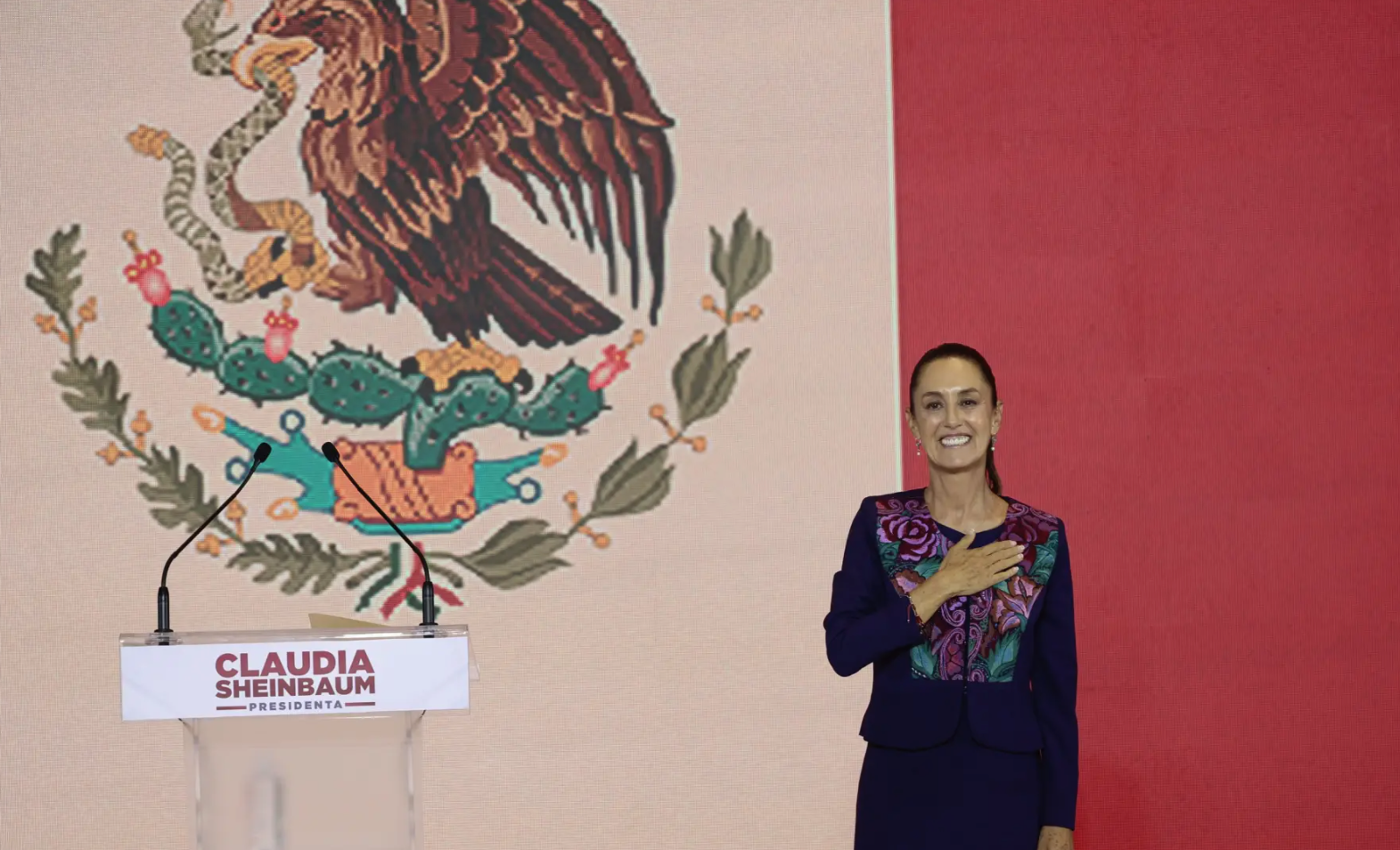After 214 years since September 16, 1810, when Mexico began its independence process to become a Republic, a woman was elected president for the first time. She is Claudia Sheinbaum Pardo, 61, the 66th president, who on October 1, 2024, will take office as head of state and government of the United Mexican States, the second-largest economy in Latin America, and as expert Jenifer M. Piscopo of the Royal Holloway University of London points out, the first trade ally of the United States.
According to official data from the Mexican National Electoral Institute, Claudia Sheinbaum Pardo, representative of the coalition Sigamos Haciendo Historia (Let’s Continue Making History), composed of the ruling National Regeneration Movement (MORENA), the Labor Party and the Ecologist Green Party of Mexico, outpolled her main rival, the candidate Xóchitl Gálvez, of the coalition Fuerza y Corazón por México (Strength and Heart for Mexico), composed of the National Action Party (PAN), the Institutional Revolutionary Party (PRI) and the Party of the Democratic Revolution (PRD).
Claudia Sheinbaum Pardo will be the president of a country that, according to the 2020 Population and Housing Census, has 126,014,024 inhabitants, of which 64,540,634 are women and 61,473,390 are men. Although it seems clear that she will be the president of all, it is important to reiterate this when the demands begin (and there will be some) about her results, mistakes, and lack of action for the cause of women.
It must be kept in mind that women in these positions are evaluated more harshly than men and in matters of equality, when they incorporate it into their agendas, they do what they can taking into account the barriers —institutional, cultural, even from their own political party allies — that are presented to them and that limit their objectives.
Women who assume the presidency of a country are expected to establish measures in favor of equality in greater proportion than is required of presidents as if the latter did not have the same commitment to the citizenry and were not as obliged as the former to establish mechanisms for the advancement of women.
It should be noted that, while it is true that a woman in this position is a reference for others, her arrival does not necessarily imply that measures in favor of equality will be established or that a pro-women agenda will be implemented. During the Mexican presidential campaign, different voices from the women’s and feminist movements expressed that only the presence of a woman in the presidency would not ensure the implementation of the feminist agenda.
There are experiences of women who have led the executives of their countries and whose presence has not implied substantive changes in favor of their peers. In most cases, they are conservatives and members of right-wing, center-right, or Christian Democrat parties. An example of this is Margaret Thatcher, a member of the Conservative Party in the United Kingdom, who on several occasions entered into disputes and depreciated the British feminist movements. In our region, this is the case of Laura Chinchilla, the only female president of Costa Rica, in office between 2010-2014 for the National Liberation Party. Her disputes with women’s and feminist movements began during her presidential campaign, and numerous organizations even issued a statement in which they pointed out that the candidate did not represent them as women. During her term in office, the questioning intensified.
In this way, it must be recognized that the arrival of a woman to the presidency is good news, but it is not enough.
Who is Claudia Sheinbaum Pardo?
Claudia Sheinbaum Pardo has high-level academic credentials and extensive expertise in environmental issues. She holds a bachelor’s degree in Physics, a master’s degree, and a doctorate in Electrical Engineering from the National Autonomous University of Mexico (UNAM). She is a researcher at the Institute of Engineering of the same institution (currently on leave from public office); a member of the National System of Researchers (SNI); with dozens of scientific publications on energy, environment, and economic development, and an h-index 23 in Scopus. In addition, she has been a consultant to the United Nations for Energy and Sustainable Development and a member of the Intergovernmental Panel on Climate Change, which received the Nobel Peace Prize in 2007 for its efforts to raise awareness of the effects of climate change. This constitutes, according to Pierre Bourdieu’s theory, part of her cultural capital.
The new president was born in Mexico City, is a mother of Jewish descent, granddaughter of emigrants from Lithuania and Bulgaria. She is the daughter of chemist Carlos Sheinbaum Yoselevitz and biologist Annie Pardo Cemo, the latter a professor emeritus in the Department of Cell Biology at UNAM, an institution that has always played an important role in Claudia’s life.
The fact that both her father and mother were scientists undoubtedly influenced what Bourdieu calls the habitus of the president. Her socialization took place in the context of an upbringing by scientists, and university students, who showed a commitment to social struggles and the need to act in politics to achieve social change. The president refers to this influence:
“I’m a daughter from 1968. My parents participated in the student movement, I was 6 years old when the massacre took place in Tlatelolco on October 2nd, and in that movement my mother participated as a teacher (…) So, that duality between politics, doing politics to transform the world, and particularly, our reality, our country, our city, and at the same time this scientific academic sense was where I grew up”.
This influence led her to become a student leader at UNAM and to actively participate in student protests during the presidency of Miguel de la Madrid. Her involvement in politics began in 2000 as Secretary of the Environment, when Andrés Manuel López Obrador (AMLO) was elected head of government of the Federal District (now Mexico City). Since that time she has been part of the outgoing Mexican president’s team. In 2012, he was part of AMLO’s presidential campaign team and is part of those who founded the National Regeneration Movement (MORENA).
In 2015, with the support of MORENA, she was elected head of the Tlalpan Delegation. In 2018, she won the elections and became the first woman to be elected head of government of Mexico City, a position from which she receded in June 2023 to run in the presidential elections. This shows that Sheinbaum Pardo is not a newcomer in political life. Her more than 20 years of political activity, holding public and elected office proves it.
Women’s ability to govern and the persistence of gender stereotypes
Claudia Sheinbaum Pardo’s trajectory shows that she not only has academic competencies but also political experience. She has won two elections, including the mayoralty of the most important city in the Mexican territory. However, like her opponent, Xóchitl Gálvez, who was head of the Delegation of Miguel Hidalgo and elected Senator of the Republic in 2018, her ability to govern has been questioned on countless occasions, demonstrating the persistence of gender stereotypes.
During the electoral process, a question was repeated and was the headline of many media: is Mexico ready to be governed by a woman president? This reflects the persistence and resistance to change in terms of the traditional roles assigned to men and women.
To wonder about women’s capabilities or openly elaborate on their inability to govern, about their political inexperience, shows, in the 21st century, that the normative changes — we must not forget that in Mexico, in 2019, a constitutional reform established parity between men and women in all public positions, at all levels, and in all powers — will continue to be insufficient unless social imagination is transformed, and it is internalized that political spaces are women’s spaces.
That all this is sexist is demonstrated by observing that, when it comes to men, one may disagree with their approaches, but one does not question their ability to govern because they are men. The same happens when it is indicated that women will follow the “orders” of some man who is behind their electoral triumph.
In the case of Claudia Sheinbaum and Xóchitl Gálvez, during the presidential campaign, it was stated that they were following the “instructions” of some male politician. In the case of the former, orders from AMLO, who, for some, “anointed” her as the chosen one, his favorite and the one called to succeed him. In addition, the president-elect has repeatedly stated that she will continue with the policies of the so-called “Fourth Transformation” implemented by the outgoing president.
In the case of Xóchitl Gálvez, it was said that she received instructions from the barons that led the political parties that made up the coalition that supported her. In both cases, the two politicians are placed in a situation of subordination, and their agency to make their own decisions is ignored. This is without denying that both had to act in a male-dominated system and had to have the approval of the leaders of the organizations that supported them to present their candidacies.
The double standard in evaluating men and women is again in evidence when it is believed that the new president will follow AMLO’s orders, without considering that generally outgoing presidents have some “dolphin” or candidate of their preference, but this does not mean that, if she wins, she will blindly obey the orders of the one who leaves office. Moreover, as Yanina Welp, of the Albert Hirschman Centre on Democracy, Graduate Institute, points out, in Latin America rarely a former president can control a president in power.
The challenges
In a complex society such as Mexico’s, there are many challenges that the president will have to face. However, it cannot be denied that among them all, the problem of violence stands out, or violence in the plural, due to its multiple manifestations, including that directed against women for gender reasons.
On this last point, feminists consider that in the proposals of the new president, there are no convincing measures to face this scourge that makes Mexico one of the most dangerous countries to be a woman and where 10 women are murdered every day.
It is too early to talk about strategies and the direction to be followed. There is certainty that the new president, in addition to the problems she will have to face as any president who is head of government and head of state, will have to overcome additional obstacles because she is a woman. There is also no doubt that a new page in Mexico’s political history begins.
*Translated by Janaína Ruviaro da Silva from the original in Spanish.












